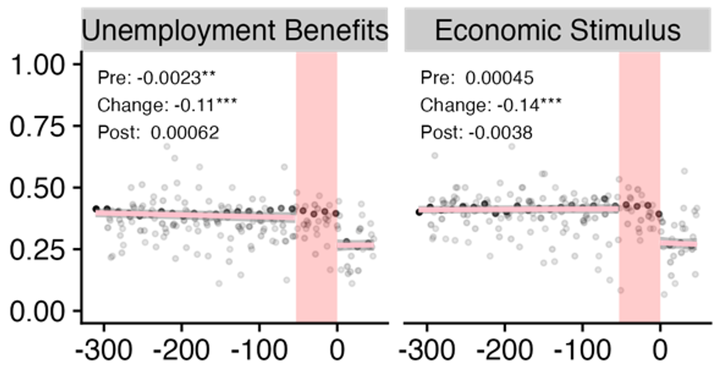Experiences and Change
 Figure S4 from Brandt et al
Figure S4 from Brandt et alAdult political attitudes are incredibly stable (Brandt & Morgan, 2022; Turner-Zwinkels & Brandt, in press), but they do change. What kinds of experiences make people change their attitudes? One idea in the research literature is that experiences that cause people to feel threatened and uncertain may cause attitude and value change. Typical approaches predict that when people experience threat they turn to conservative political attitudes. This is because the resistance to change and deference to authority found in many conservative attitudes may help people cope with the uncertainty experienced with a threat.
The lab’s work has found that this typical approach makes inaccurate predictions because the link between life experiences and attitude and value change is highly variable (for a review see Brandt & Bakker, 2022). For example, in a study of over 50 countries, we find that the link between perceived threat and political attitudes varies by the specific threat (e.g., of violence, economic downturns, the police), the specific political attitudes (e.g., economic attitudes, cultural attitudes), and the country (Brandt et al., 2021). The variability extends to individuals. Using panel data, we’ve estimated how the onset of the pandemic affected people’s attitudes and values (Brandt et al., in press). We found only a few overall changes, but we also found substantial variability around these average effects. That is, threatening life experiences do not shape attitudes and values in the same way for all people.
Other experiences we are interested include people’s socio-economic status and their cultural context (e.g., Brandt, 2013; Brandt et al., 2020).
Key Project Publications
- Brandt, M. J. (2013). Do the disadvantaged legitimize the social system? A large-scale test of the status-legitimacy hypothesis. Journal of Personality and Social Psychology, 104, 765-785. Footnote 7 Results| Footnote 9 Results doi | pdf | code
- Brandt, M. J. & Bakker, B. N. (2022). The complicated but solvable threat–politics relationship. Trends in Cognitive Sciences, 26, 368-370. doi | pdf
- Brandt, M. J., Kuppens, T., Spears, R., Andrighetto, L., Autin, F., Babincak, P. … & Zimmerman, J. L. (2020). Subjective status and perceived legitimacy across countries. European Journal of Social Psychology, 50, 921-942. doi | pdf | code | data
- Brandt, M. J. & Reyna, C. (2017). Individual differences in the resistance to social change and acceptance of inequality predict system legitimacy differently depending on the social structure. European Journal of Personality, 31, 266-278. doi | pdf | code | data
- Brandt, M. J., Turner-Zwinkels, F. M., Karapirinler, B., van Leeuwen, F., Bender, M., van Osch, Y., & Adams, B. G. (2021). The association between threat and politics depends on the type of threat, the political domain, and the country. Personality and Social Psychology Bulletin, 47, 324-343. doi | pdf | code | data
- Brandt, M. J., Vallabha, S., & Turner-Zwinkels, F. (2025). The onset of the COVID-19 pandemic made people feel threatened, but had a limited impact on political attitudes in the United States. Personality and Social Psychology Bulletin, 51, 284-300. doi | pdf | code
- Brandt, M. J., Wetherell, G., & Henry, P.J. (2015). Changes in income predict change in social trust: A longitudinal analysis. Political Psychology, 36, 761-768. doi | pdf | code
- Cassario, A. L. & Brandt, M. J. (in press). Testing theories of threat, conservatism, and individual difference: Little evidence of personality based individual differences in ideological responses to threat. Social Psychological and Personality Science. pdf | code | data
- Kesberg, R., Brandt, M. J., Easterbrook, M., Spruyt, B., & Turner-Zwinkels, F. (2024). Finding (dis-)advantaged system justifiers – A bottom-up approach to explore system justification theory. European Journal of Social Psychology, 54, 81-96. doi | pdf | code | data
- Proulx, T. & Brandt, M. J. (2017). Beyond threat and uncertainty: The underpinnings of conservatism. Social Cognition, 35, 313-323 doi | pdf
- Stavrova, O., Evans, A. M., & Brandt, M. J. (2021). Ecological dimensions explain the past, but do not predict future changes in trust. American Psychologist, 76, 983-996. doi | pdf | code | data